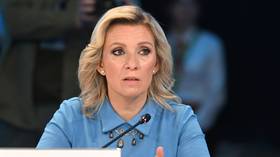Russia summons French envoy over Macron’s G20 snub
Moscow has strongly protested against what it called a “Russophobic” stunt at Emmanuel Macron’s press conference
The Russian Foreign Ministry summoned the French ambassador to Moscow, Pierre Levy, on Monday over the treatment of Russian journalists at President Emmanuel Macron’s press conference at the G20 summit more than a week ago.
RIA Novosti correspondents and an editor-in-chief at the ‘Russia-News’ media outlet were denied access to the event in a “brutal manner,” the ministry said in a statement, calling the actions of the French authorities “discriminatory and openly Russophobic.”
Such actions “blatantly violate the principle of press freedom,” the statement said, adding that the fact that the French authorities refused to apologize for the incident and sought to seize the Russian journalists’ phones instead shows France’s “determination to enforce a segregation regime against the Russian media.”
Persecuting Russian journalists is nothing but one of the many efforts by French authorities to stifle any dissent, the ministry said. Through the French ambassador, Moscow has demanded Paris stop exerting pressure on any undesirable media. France should also stop discriminating against Russian media outlets and start treating them in the same open way Russia treats the French ones, it added.
The incident took place during a G20 summit held on September 9 and 10 in New Delhi, India. The Russian Foreign Ministry’s spokeswoman, Maria Zakharova, branded the actions of the French authorities a “wild manifestation of Nazism.”
The EU banned all Russian ‘state media’ – from RT and Sputnik to public broadcaster VGTRK – and persuaded YouTube to enforce that ban globally when the conflict between Russia and Ukraine began.
However, Macron had an arguably thorny relationship with the Russian media long before the current conflict, as Macron’s campaign refused to accredit reporters from RT and Sputnik back in 2017. Since then, RT crews have received an array of bizarre explanations meant to justify barring them from attending government events. In January 2018, for instance, RT France was blocked from covering Macron’s visit to Rome.
In October 2023, a French government spokesman acknowledged that the Elysee Palace intentionally barred the Russian media outlets from covering its events, as it considered them to be not “media, but propaganda.”
You can share this story on social media:








Comments are closed.